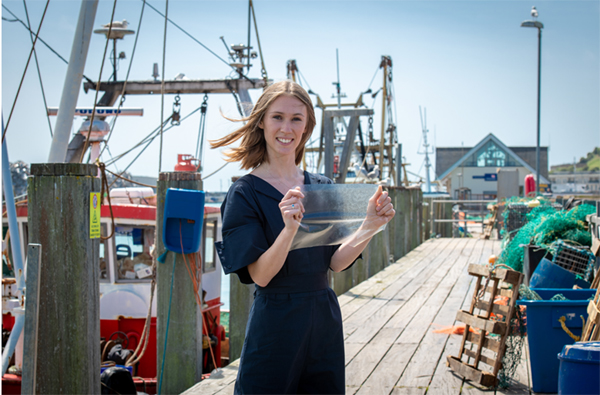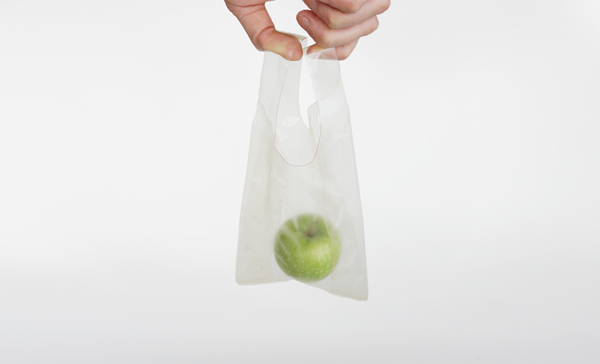|
|

|
  
Features
Update 2019/10/2
Plastics
brought to you in part by

DESIGN STUDENT WINS 2019 JAMES DYSON AWARD FOR BIO-DEGRADABLE ALTERNATIVE TO PLASTIC
By Suzanne Forcese
An eco-friendly, biodegradable, compostable plastic alternative made from fish waste and red algae that can break down in 4-6 weeks is the James Dyson Award winning design of a 23 year old University of Sussex, Product Design graduate. Lucy Hughes has created MarinaTex, a product incorporating circular values that looks and feels like plastic but is actually stronger.

Lucy Hughes With MarinaTex Bio-Degradable MarinaTex Plastic Alternative
Photo Courtesy Lucy Hughes
“I would consider myself a designer as I am particularly interested in the justification of design,” Hughes told WaterToday in an inspiring interview. “This is someone who asks the question: Why is this design needed?”
Why indeed. With an annual global production of 320 million tonnes of plastics and only 9% being recycled, there is a glut of plastics in landfills and in our marine environments. As these plastics are broken down either by incineration or environmental action, they become smaller and smaller. The smallest pieces, called microplastics have been measured in the air we breathe, the water we drink, the food we eat.
Another problem that Hughes looked at was fish waste. In the UK, 492,020 tonnes of fish waste is produced every year. To answer her own question, the design of MarinaTex was needed to repurpose fish waste and reduce plastic consumption. One Atlantic Cod for example provides enough raw material to produce 1400 bags.
“My vision for MarinaTex reaches beyond the product. I see this as a commitment to material innovation and appropriate selection according to the use of the product. A normal plastic bag has an average usage life of 20 minutes. We have been designing for the run up to those 20 minutes. However we have not been designing for the extended lifecycle of the product when the user then disposes of that product. This was thought to be a consumer issue. However, it is a design and manufacture issue. This is the true design challenge.”
Hughes’ design is perfect for single use as a protective wrap, as bags, as containers. It is translucent and flexible with a higher tensile strength than low density polyethylene (the current material in plastic bags).

MarinaTex Bag – Stronger than single use plastic and completely bio-degradable in 4-6 weeks. Photo Courtesy Lucy Hughes
Hughes, who grew up in Twickenham, England, was exposed to adventure in her family of outdoor lovers and sports enthusiasts. “As soon as I was old enough (12), we went out to Egypt to get our diving qualifications. I have been diving ever since and have participated in marine conservation and education as a result.”
“As a young child I was quite scared of the ocean. It seemed so powerful and relentless. It was only when I could get beneath the waves and discover its treasures in such a tranquil environment did the fear transform to respect. Diving changed my perspective of the ocean and in doing so built a connection.”
It was that sense of connection mingled with her adventurous spirit that gave birth to her meaningful yet purposeful design.
“In design we are taught to follow a diverging and converging process. This diverges when we begin to ideate, to then converge when we are prototyping and testing our solutions. Typically the ‘aha moment’ comes toward the end of this process. My process was a little different, I seemed to constantly diverge and converge and go backwards. My process was more like a squiggle. However, I think the ‘aha moment’ was when I first combined the red algae with the fish scales.” Hughes did have some hiccups in her process when 76% of her test samples went mouldy. What made her persevere was that one amazingly uniform, consistent and flexible quality. “This made me look deeper into the components of the scale skins.”
Hughes went to a fish processing plant to identify waste flows. “Once I could see what was being wasted, I went away and researched the composition of the different channels of waste. The research guided my experiments.”
“When I was at the processing plant I felt the skins and the scales and I was amazed at the flexibility and strength. This got me looking into nature’s building blocks and I was astounded to find that the natural world can make so much out of so little. It was then a case of researching into how these building blocks could be used to create material.” The material is comprised of waste material from the fishing industry and organic binders sourced from the sea.
“Good design is something that places form, function and footprint at equal importance,” Hughes emphasizes. “I hope that this will encourage other designers to not think of sustainability or footprint as an afterthought but to place it into the design brief.”
Hughes is taking that bigger picture view into the classroom where she will be running a session at the University of Sussex. “I would also love to spread the word about the circular economy and how it should be applied in design.”
“Nature has evolved to thrive through symbiotic relationships. I hope that humans can react to the changes they have inflicted on the planet by working with nature rather than exploiting it.”
The James Dyson Award is an international design award that celebrates, encourages and inspires the next generation of design engineers. “Young design engineers have the ability to develop tangible technologies that can change lives. The Award rewards those who have the persistence and tenacity to develop their ideas.” James Dyson.
Video Courtesy Lucy Hughes
https://youtu.be/YJ7esQeh-Cw
suzanne.f@watertoday.ca
|
|
|
Have a question? Give us a call 613-501-0175
All rights reserved 2025 - WATERTODAY - This material may not be reproduced in whole or in part and may not be distributed,
publicly performed, proxy cached or otherwise used, except with express permission.
|
| |